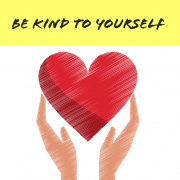Be Kind To Yourself
“If your compassion does not include yourself, it is incomplete…” – Buddha

We know that feeling compassionate towards others is a good trait to have.
Feeling compassionate means we are aware and are moved by the suffering of others. Research is showing that being compassionate towards other can increase our well-being.The part of the brain responsible for compassion and empathy is the cerebral cortex. If it’s working well, we feel kindness, care and understanding for people.
Self-compassion is where compassion turns inward and those feelings of kindness and understanding are directed at ourselves at those times when we feel inadequate or if we fail rather than drowning ourselves with self-criticism. With 3 million people in Australia living with depression or anxiety, it seems self-compassion may be missing in a lot of lives. There’s good reason to be self-compassionate and science is showing us why.
A study at Duke University, Wake Forest University, and Louisiana University on self-compassion showed:
- People who were self-compassionate tended to be more optimistic and had a tendency not to believe that their problems were worse than other people’s problems.
- A person with a high level of self-compassion experiences the feeling of kindness towards oneself, and takes on a nonjudgmental attitude towards their own inadequacies and failures, recognising that experiencing those failures is normal.
- People who were self-compassionate had less sadness, anxiety, and negative feelings.
Top 5 Ways to Feel Self Compassion
DO WHAT MORE OF WHAT BRINGS YOU JOY
Whether it’s playing with your dog, gardening or working out at the gym, so more of what makes you happy. Write a list of things that you enjoy so when you are feeling negative you can read the list and choose something that works for you.
PUT YOURSELF FIRST
Many of us spend time tending to the needs of others that we put ourselves at the bottom of the priority list. Putting self-care higher up the list will improve well-being and therefore improve our ability to look after others.
BREATHE
Deep breathing such as Box Breathing or any meditation practice calms the central nervous system, alleviating stress and anxiety.
EXERCISE
Exercise is not only physically good for us, but it taps into the emotional parts of the brain that trigger the release of ‘feel good’ hormones. You don’t have to sweat it out at the gym as even smaller, short bursts of exercise have a positive effect on our mood.
EAT WELL
When we are feeling down about ourselves we often crave high sugar and fat foods which release the hormone, dopamine, making us feel good in the short term. Our brains are wired to seed pleasure, so we turn to these foods to seek the positive feelings they bring. Research is showing a link between mood and food intake which can lead to health problems (https://www.ncbi.nlm.nih.gov/pmc/articles/PMC4150387/) Eating a balanced diet of plenty of vegetables, fruit, protein, good fat, complex carbs and fibre will curb the sugar craving and stabilise mood swings.
BE SOCIAL
Being around friends and family who matter most can have a positive effect on your mental and physical health. If you’re feeling negative thoughts about yourself, call a friend you can confide in or even just have a chat. Often speaking with other puts a different perspective on things.













